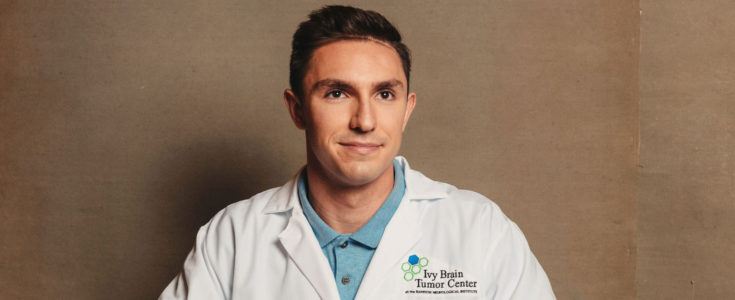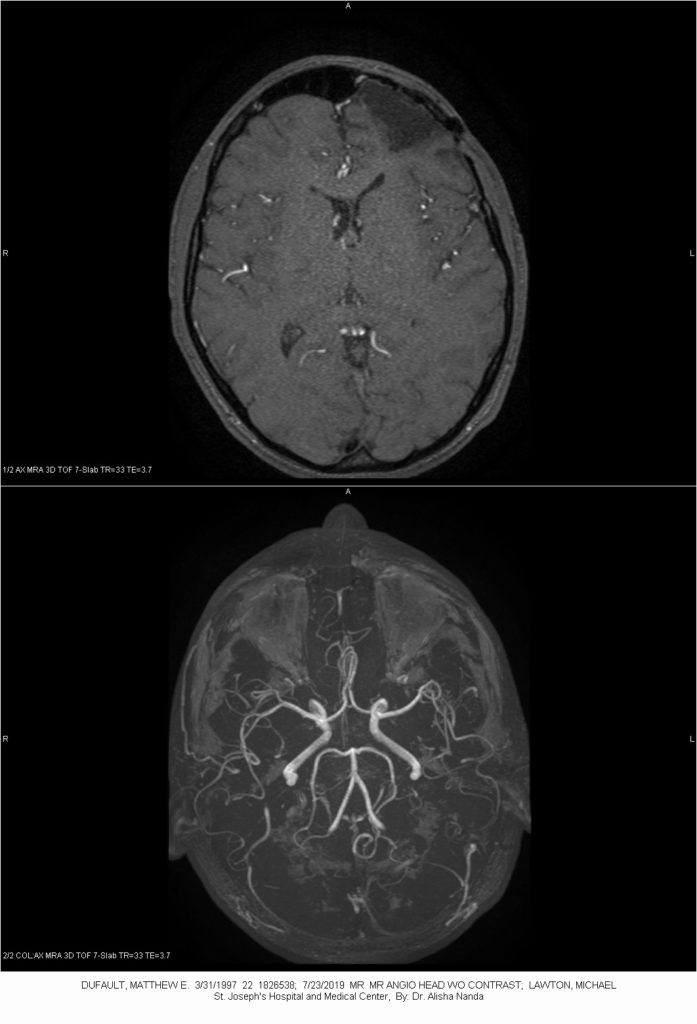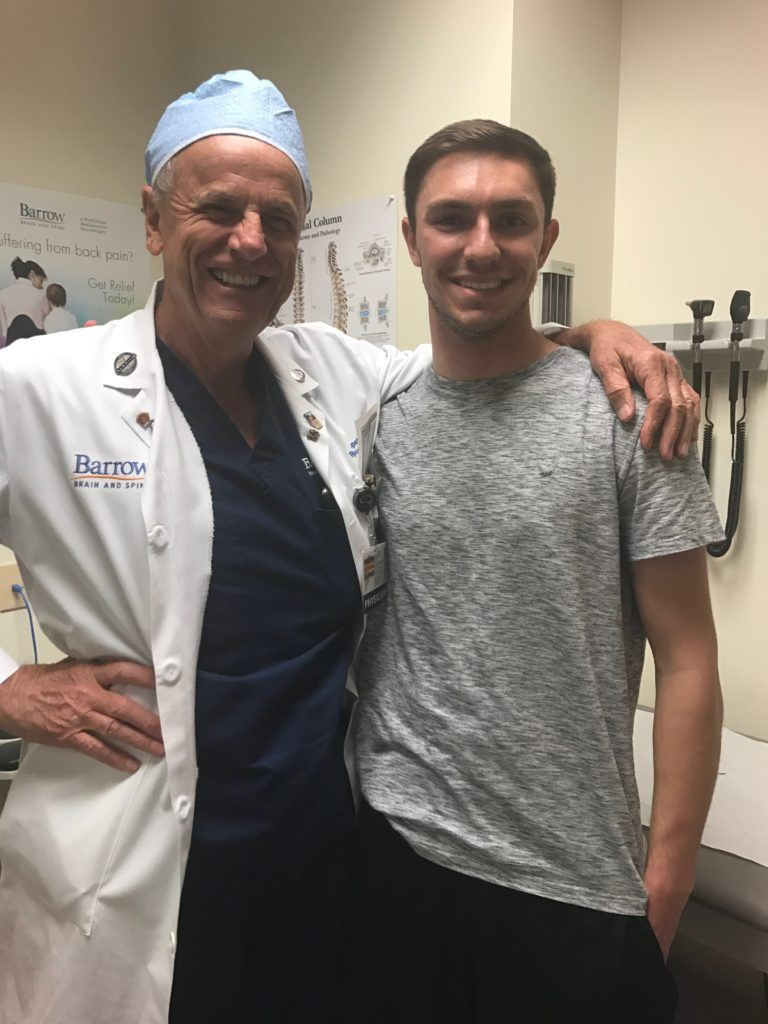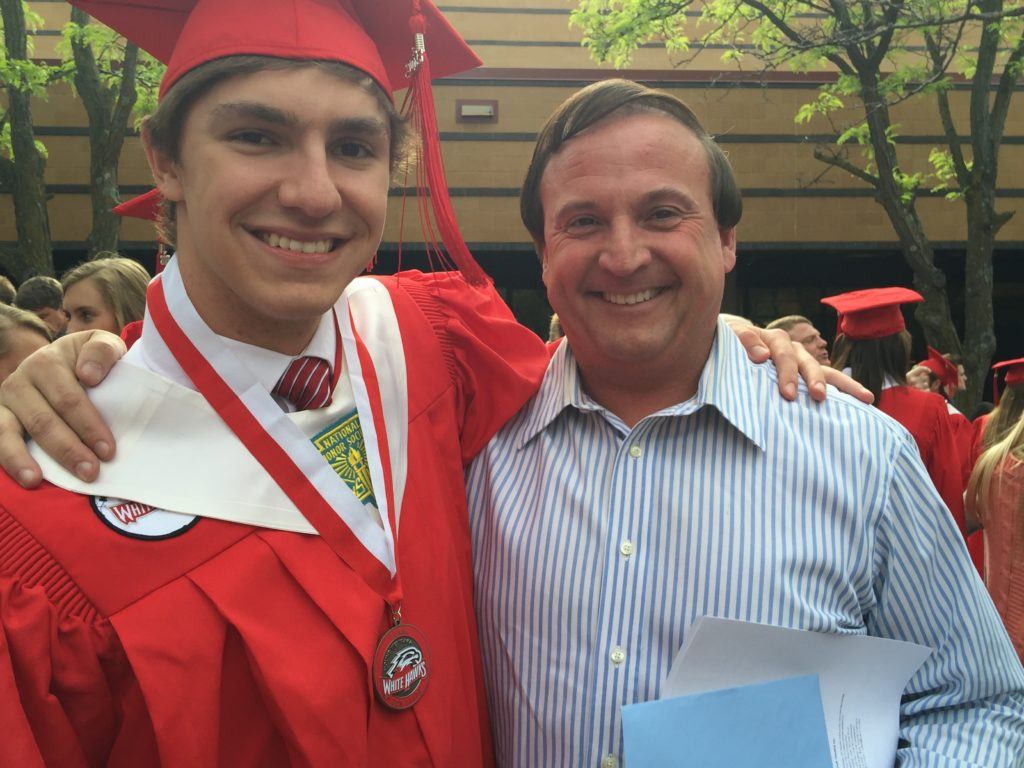
Ivy Blog
It’s Personal: Matthew Dufault
- March 23, 2021
- Ivy Center
- Posted in #ItsPersonal

“GBM is a disease that is very, very aggressive and very difficult for patients and their families to deal with, but the system we have here brings patients a lot of hope. And that is really what brings me to work and motivates me every day.”
-Matthew Dufault, Research Technician at the Ivy Brain Tumor Center
As part of the Ivy Center’s #ItsPersonal campaign, we are sharing the stories of the doctors, researchers and nurses that are personally impacted by brain cancer. Today, we introduce you to Matthew Dufault, a research technician in the Ivy Brain Tumor Center’s preclinical lab at the Barrow Neurological Institute.
As a research technician, Matthew plays an integral role in identifying new therapies through Ivy Phase 0 trials that will increase life expectancy and contribute to a cure for brain cancer. “The impact this will have on patients and their families is everything,” Matthew shared.

Matthew knows firsthand about this impact—his personal connection with neurological disease began as an adolescent when he was diagnosed with an arteriovenous malformation (AVM).
“When I was 13, I was just going through a normal day with my friends at lunch when I started having these odd symptoms,” Matthew explained. “At first I didn’t really think much of it, because I’d never had any real medical problems until then.”
Later that day, he ended up blacking out, and when he woke up, he found himself in a hospital bed, being told he had an arteriovenous malformation in the left frontal lobe of his brain and needed a brain surgery to remove it.
After an initial surgery, and years of what felt like a waiting game, Matthew was a freshman at Arizona State University when it was discovered that the residual AVM had almost grown back to its original size. So, he and his family turned to Barrow Neurological Center, where he met Dr. Robert F. Spetzler.
“He knew that I was interested in this disease and neurological diseases in general, so he took the time to explain things,” Matthew recalled about Dr. Spetzler. “And that made a huge difference for me as it made me feel very comfortable and in good hands. For the first time I had lost a lot of anxiety that had been with me all for those years .”

Almost four years after Dr. Spetzler resected Matthew’s AVM at Barrow, Matthew found himself working at Mayo Clinic researching glioblastoma, but his internship was coming to an end. Fortunately, an incredibly opportunity was headed his way.
“When I heard the Ivy Brain Tumor Center was hiring my heart skipped a beat…probably several beats,” Matthew said. “It was almost four years ago that Dr. Spetzler resected an arteriovenous malformation from my left frontal lobe right here at Barrow, and now I was in the perfect place to apply and give back to Barrow and the patients through research.”
That research includes the Ivy Center’s Phase 0 clinical trials program, which is the largest in the world and the first of its kind in neuro-oncology. These accelerated Phase 0 clinical trials discover therapy combinations for individual patients with glioblastoma and other aggressive brain tumors.
“Since I started working at the Ivy Brain Tumor Center and even a couple years back when I began doing glioblastoma research, I’ve always asked myself well, what if someone I know and what if someone I love, gets this disease?” Matthew wondered. “But it seems impossible, right? Because it’s so rare.”
Unfortunately, that day came in May 2020 when Matthew received a call from his dad, telling him that a tumor, which ended up being glioblastoma, had been found in his uncle Dale’s brain.

“But that tumor hasn’t changed Dale at all. He’s still his same old self and he’s doing great,” Matthew said. “And it gives me a deeper reason for being here beyond just the science and knowing that this disease is so deadly. Now this disease has hit home and its real.”
And that realness and passion translates into his everyday role. Finding something that works for each of them is at the heart of what he does. “I surely appreciate the science, but I’m most strongly motivated to battle this disease for the lives of the patients,” Matthew shared. “Every new mechanism we unveil and every new treatment we optimize teaches us more about cancer and the brain and brings real hope to patients and families that need it.”
Looking to the future, Matthew hopes to be accepted to a medical school and become a neurosurgeon, incorporating research to provide better techniques and therapies for patients with neurological diseases, a goal he had formed through his personal AVM battle that lasted many years. “My Barrow experience as a patient was so personal and healing, and that is what I want to give patients in my medical career.”
Have you been personally impacted by brain cancer? We welcome you to share your story on social media using the hashtag #itspersonal and tag the Ivy Brain Tumor Center. We will share as many as we can to support this movement as we work to build awareness and help those suffering from aggressive brain tumors.
Click here to learn more about why the fight against brain cancer is personal to the team at the Ivy Center.
For more information about our Phase 0 clinical trials, please contact an Ivy Navigator at 602-406-8605.
